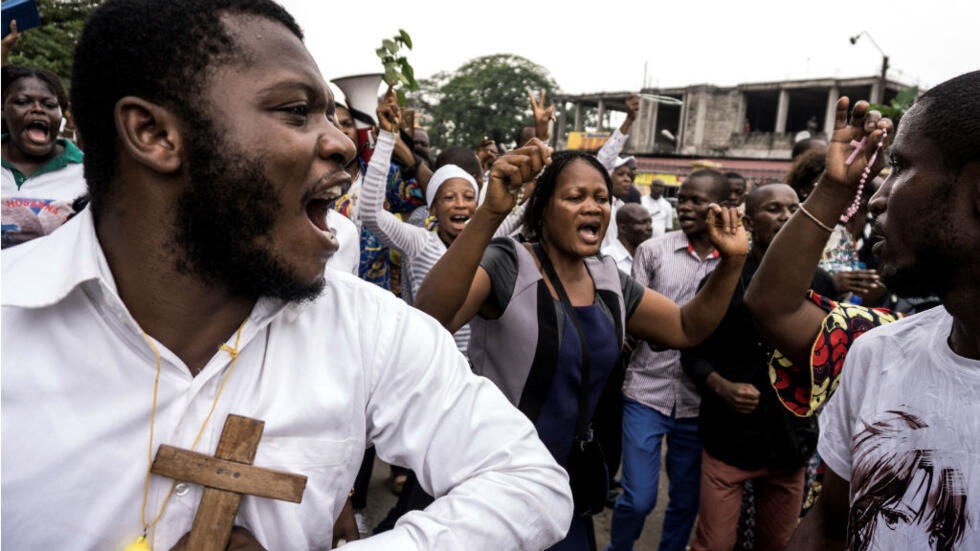Several killed as DR Congo tries to halt anti-Kabila protests
At least seven people were killed in the Democratic Republic of Congo on Sunday amid protests against President Joseph Kabila's refusal to step down from power, a UN spokesperson said.
Issued on:

Security forces shot dead at least seven people in Kinshasa, said Florence Marchal, spokeswoman for the UN peacekeeping mission in Congo. Another person was killed in a protest in the central city of Kananga, although she said the cause of that death was not yet clear.
A policeman was among those killed, AFP reported earlier.
Despite appeals from the United Nations and others to respect people's right to protest, troops fired tear gas into churches and bullets in the air to break up gatherings at Catholic masses.
Catholic churches and activists had called for peaceful protests to mark a year since an accord was signed to set a new election date, free political prisoners and ease tensions, saying the terms of the deal have not been met.
The protesters are demanding that Kabila promise he would not once again seek to extend his time in power in the mostly Catholic former Belgian colony. A series of election delays has fuelled suspicions that Kabila will try to remove the constitutional term limits that forbid him from running again, raising fears that Congo will slide back into the kind of civil war that killed millions at the turn of the century.
Kabila has been in power since 2001.
Public impatience boiled over on Sunday, with the vast central African country's main opposition and civil society groups joining in the call for protests.
“It’s very unlikely that he (Kabila) would simply step down,” historian and regional expert Gérard Prunier told FRANCE 24.
The next elections are scheduled to take place before June 2018, but even with this latest delay it's "rather unlikely" that Kabila will let them go ahead, Prunier said.

Soldiers storm church
A churchgoer who asked not to be named told AFP that officers dispersed worshippers from a mass in the parish of St. Michael's in central Kinshasa on Sunday morning.
"While we were praying, the soldiers and the police entered the church compound and fired tear gas at the church," he said.
Another parishioner who identified herself as Chantal said: "People fell, first-aiders are resuscitating old ladies who have fallen" -- but added that the priest carried on saying mass.
Officers later detained 12 altar boys dressed in their liturgical robes outside one church as they led a protest march.
Earlier at the Notre-Dame of Congo Cathedral in Gombe, north Kinshasa, security forces also fired tear gas as opposition leader Felix Tshisekedi arrived, AFP journalists saw.
The parish priest asked worshippers to "return to their homes in peace because there is a heavy presence of soldiers and police ready to fire".
In Kinshasa, Catholics of the "Lay Coordinating Committee" had invited worshippers to walk, holding bibles, rosaries and crucifixes, after mass on Sunday.
'Doubtful' that social unrest could spread
They want Kabila, 46, to declare publicly that he will not run for another term as president.
"If there is a lot of bloodshed in the streets in Kinshasa then Kabila could fear ... an uprising against him,” Thierry Vircoulon, associate researcher at IFRI's Sub-Saharan African programme, told FRANCE 24.
“What will have an impact,” Vircoulon added, “is how long the Catholic community and opposition can sustain protests and if this spreads to other towns.

“For the time being the opposition has not been able to go mobilise people for a long time apart from at Kinshasa. So it appears doubtful that this social unrest could spread. That's also because people are very poor so they can't afford to take time off to protest and security forces have always been able to maintain control."
Elections delayed
The vast, mineral-rich country has not had a peaceful transition of power since independence from Belgium in 1960.
Kabila succeeded his assassinated father Laurent Kabila in 2001. He refused to step down at the end of his second and final term in December 2016. That refusal led to protests and a bloody crackdown.
Elections had been due to take place by the end of this year under a church-mediated deal. The delayed poll is now scheduled for December 23 next year.
Congolese authorities cut off Internet access "for reasons of state security" before the planned march on Sunday.
The army and the police deployed in large numbers at churches across Kinshasa, the capital of around 10 million people.
Security forces also set up roadblocks in several parts of the city. The army and the police were stopping and searching vehicles.
Government alleges 'insurrection' plan
Government spokesman Lambert Mende alleged in televised comments that "weapons of war have been distributed" by opponents of the government.
"These destabilising acts of agitation aim to create an atmosphere of insurrection which would enable them to seize power in our country by undemocratic means," he said, citing a government report.
Kabila has yet to speak publicly about the latest round of protests.
International powers such as the United Nations have called on the Congolese authorities to allow peaceful protests.
(FRANCE 24 with AFP, REUTERS and AP)
Daily newsletterReceive essential international news every morning
Subscribe